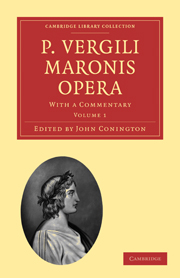INTRODUCTION TO THE ECLOGUES
Published online by Cambridge University Press: 07 September 2010
Summary
The history of Pastoral Poetry shows us how easily the most natural species of composition may pass into the most artificial. Whatever may have been its earliest beginnings—a question which seems to belong as much to speculation as to historical inquiry—it appears not to have been recognized or cultivated as a distinct branch till the Greek mind had passed its great climacteric, and the centre of intellectual life had been transferred from Athens to Alexandria. Yet as introduced into the world by Theocritus, if modern criticism is right in supposing him to have been its real originator, it exhibits little of that weakness and want of vitality which might have been expected to distinguish the child of old age. It is a vigorous representation of shepherd life, with its simple habits, its coarse humour, its passionate susceptibility, and its grotesque superstition. But it was not long to retain this genuine character of healthy, dramatic energy. Already in the next age at Syracuse it began to show signs of failing power: and on its transference to Rome, these were at once developed into the unmistakeable symptoms of premature constitutional decay. What it became afterwards is characteristically described in one of Johnson's sarcastic sentences. “At the revival of learning in Italy,” he says in his Life of Ambrose Philips, “it was soon discovered that a dialogue of imaginary swains might be composed with little difficulty: because the conversation of shepherds excludes profound or refined sentiment: and for images and descriptions, Satyrs and Fauns, and Naiads and Dryads, were always within call; and woods, and meadows, and hills, and rivers supplied variety of matter, which, having a natural power to soothe the mind, did not quickly cloy it.”
- Type
- Chapter
- Information
- P. Vergili Maronis OperaWith a Commentary, pp. 1 - 18Publisher: Cambridge University PressPrint publication year: 2010First published in: 1858



